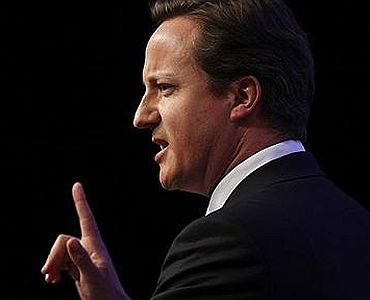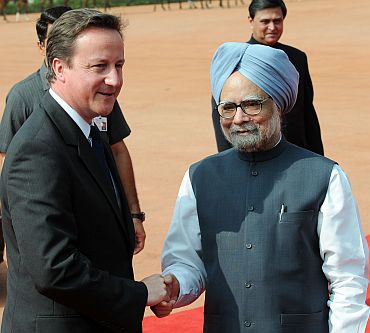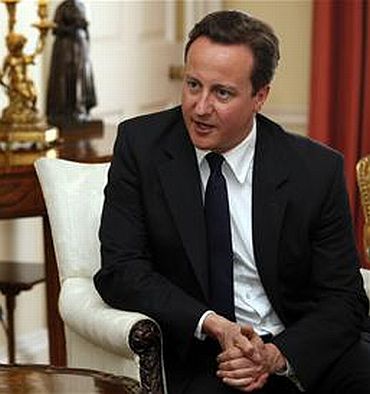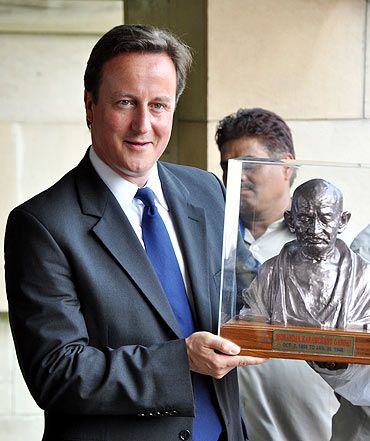 | « Back to article | Print this article |
'It's unacceptable. Pak must eliminate Lashkar'
Unfazed by Pakistan's angry reaction, British Prime Minister David Cameron has said that the existence of terror groups like Lashkar-e-Tayiba on its soil was "not acceptable" and it must eliminate them to end terrorism in India.
He endorsed the views of Prime Minister Manmohan Singh, who asked the world community to press Pakistan to fulfil its commitments to end terrorism directed against India with equal seriousness as on the western border with Afghanistan.
Dr Singh and Cameron expressed concern over the terrorism emanating from Pakistan after their wide-ranging talks during which they reviewed the situation in the region, including in Afghanistan, besides discussing bilateral issues.
Click on NEXT to read further...
No cause is 'good enough' to justify terror
Addressing a joint press conference with Cameron after the talks, Dr Singh said the two leaders agreed that terrorism constitutes the single biggest threat to the region and the world and no cause was "good enough" to justify it.
Cameron said there was not only a threat of terrorism, originating from Pakistan, but it was a reality seen in Mumbai, streets of London and "weeks after weeks" in Afghanistan.
"The Pakistan government needs to crack down and eliminate terror groups whether LeT, Afghan Taliban, Pakistan Taliban. Pakistan has taken some steps but it needs to do more, so that we can reduce and eliminate the threat of terrorism, whether here in India, Pakistan or Afghanistan or in the streets of London," he said.
"It is not acceptable, as I have said, for there to be within Pakistan existence of terror groups that cause terrorism within Pakistan, outside Pakistan, in Afghanistan, India and elsewhere in the world," he said.
'I believe in talking frankly, clearly and openly'
Cameron said Britain would continue to work with Pakistan to encourage them to crack down and take on these groups.
When it was pointed out that Pakistan was angry over his adverse comments made in Bangalore on Wednesday and attributed it to his "inexperience", the 44-year-old British Prime Minister said he believed in talking "frankly, clearly and openly".
He said "no one is in any doubt, least of all Pakistan government itself" that terror groups are based in that country which need to be targeted.
He said he would discuss with Pakistan President Asif Ali Zardari next week this issue in a frank manner.
Dr Singh said after 9/11, the world community has realised that terrorism constitutes a serious threat to civilised societies of the world and no cause could justify it.
'Pakistan should be serious'
"I sincerely hope that the government of Pakistan will honour its commitments given to me and my predecessor that Pakistan will not allow its territory to be used for terror activities," Prime Minister Dr Singh said.
He added that "Pakistan should be as serious" in defeating terrorism directed against India as it was on its western border.
"I hope the world community would promote this cause," Dr Singh said.
Cameron, who is on his first State visit after becoming prime minister in May, discussed with Dr Singh ways in which the two countries could cooperate more closely in the field of security, defence, trade, civil nuclear, education, science and technology and culture.
New opportunities beckon India, Britain
The two countries decided to double their trade from $12 billion in the next five years as they set up a CEOs' Forum besides identifying various areas of boosting cooperation.
The British Prime Minister pitched for a permanent seat for India in the expanded UN Security Council as he praised the country's dynamism, especially in the economic field.
The two countries signed an MoU in the field of culture.
The two sides welcomed the "new opportunities" for cooperation that have opened up in the civil nuclear power sector following the signing of an agreement in this field earlier this year, a joint statement issued after the talks said.
They noted the excellent cooperation between Delhi Police and Metropolitan Police of London in preparing for the 2010 Commonwealth Games and looked forward to a safe and successful Games in New Delhi in October.




